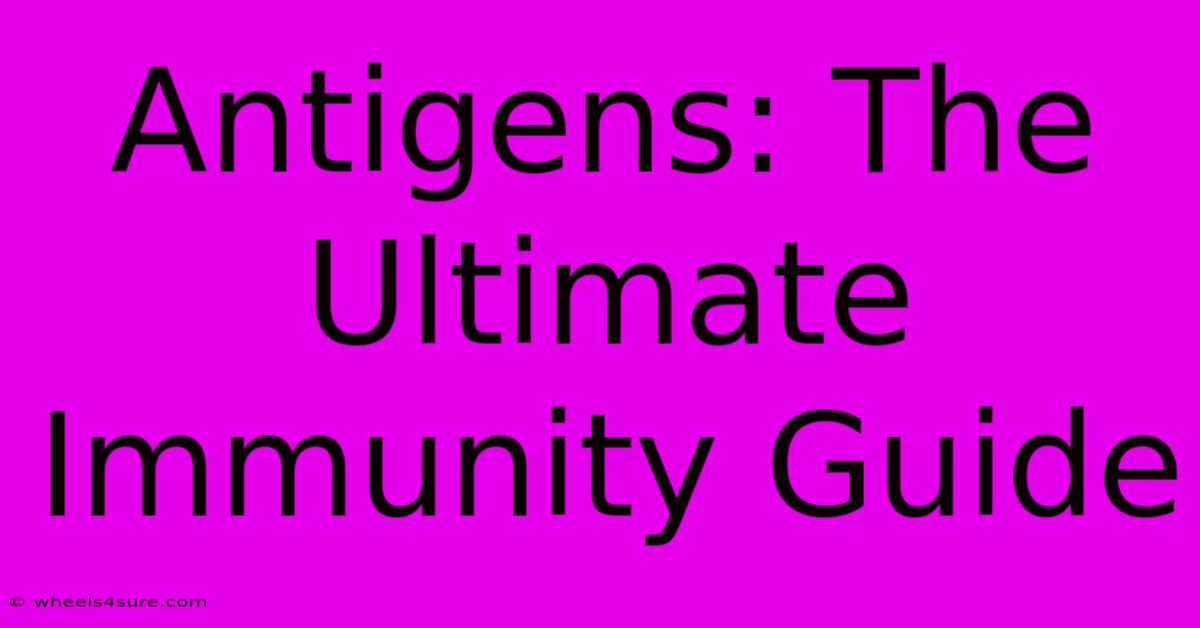Antigens: The Ultimate Immunity Guide

Table of Contents
Antigens: The Ultimate Immunity Guide
Understanding antigens is crucial to understanding how our immune system works and how we can stay healthy. This comprehensive guide will explore everything you need to know about antigens, their role in immunity, and their implications for our health.
What are Antigens?
Antigens are substances that trigger an immune response in the body. They are molecules, often proteins or polysaccharides, found on the surface of pathogens (like bacteria, viruses, fungi, and parasites) and other foreign substances. Think of antigens as the "enemy flags" that our immune system recognizes. When an antigen is detected, it sets off a chain reaction, leading to the activation of various immune cells and the production of antibodies. Not all antigens are harmful; some are harmless substances like pollen or pet dander, triggering allergic reactions.
Types of Antigens:
Antigens can be categorized in several ways:
-
Exogenous antigens: These originate from outside the body and enter through various routes like inhalation, ingestion, or injection. Examples include bacterial toxins, viral proteins, and allergens.
-
Endogenous antigens: These are generated inside the body, often from infected or cancerous cells. The immune system recognizes these as foreign and targets them for destruction.
-
Autoantigens: These are normally harmless self-antigens that the immune system mistakenly identifies as foreign. This mistaken identity is the basis of autoimmune diseases like rheumatoid arthritis and lupus.
How Antigens Trigger the Immune Response:
The immune system has two main branches: the innate and the adaptive immune systems.
-
Innate Immunity: This is the body's first line of defense. It involves non-specific mechanisms that recognize and respond to a broad range of antigens. Cells like macrophages and neutrophils engulf and destroy antigens.
-
Adaptive Immunity: This is a more targeted and specific response. When an antigen is detected, specialized cells called B cells and T cells are activated. B cells produce antibodies that bind specifically to the antigen, neutralizing it or marking it for destruction. T cells directly attack infected cells or help regulate the immune response.
The Role of Antibodies:
Antibodies, also known as immunoglobulins, are Y-shaped proteins produced by B cells. They are highly specific to particular antigens. When an antibody binds to its target antigen, several things can happen:
-
Neutralization: The antibody blocks the antigen from binding to its target, preventing infection or damage.
-
Opsonization: The antibody coats the antigen, making it easier for phagocytes (like macrophages) to engulf and destroy it.
-
Complement Activation: The antibody triggers the complement system, a cascade of proteins that helps to destroy the antigen.
Antigens and Immunity: Implications for Health
Understanding antigens is key to understanding a variety of health issues:
-
Infectious Diseases: The ability of our immune system to recognize and respond to antigens from pathogens is crucial for preventing and overcoming infections. Vaccines work by introducing weakened or inactive antigens to stimulate an immune response without causing illness.
-
Allergies: Allergies occur when the immune system overreacts to harmless antigens like pollen or pet dander, triggering an inflammatory response.
-
Autoimmune Diseases: Autoimmune diseases result from the immune system attacking the body's own tissues, due to the misidentification of self-antigens.
-
Cancer: Cancer cells often express unique antigens that can be targeted by the immune system. Immunotherapy treatments aim to harness the body's immune system to fight cancer.
Boosting Your Immune System:
While you can't directly control the antigens you encounter, you can take steps to support a strong immune system:
-
Maintain a healthy diet: A balanced diet rich in fruits, vegetables, and whole grains provides essential nutrients for immune function.
-
Get enough sleep: Sleep is crucial for immune cell regeneration and function.
-
Manage stress: Chronic stress weakens the immune system. Practice stress-reducing techniques like exercise, yoga, or meditation.
-
Exercise regularly: Regular physical activity boosts immune function.
-
Avoid smoking: Smoking damages the immune system and increases susceptibility to infections.
Conclusion:
Antigens play a fundamental role in our immune system. By understanding how they work, we can better understand and protect ourselves against infections, allergies, and other immune-related disorders. Maintaining a healthy lifestyle is key to supporting a robust immune system capable of effectively responding to the constant challenge of antigens.

Thank you for visiting our website wich cover about Antigens: The Ultimate Immunity Guide. We hope the information provided has been useful to you. Feel free to contact us if you have any questions or need further assistance. See you next time and dont miss to bookmark.
Featured Posts
-
Happy Birthday Daughter A Message Of Inspiration
Apr 15, 2025
-
Maxx Morandos Age Addressing Common Questions
Apr 15, 2025
-
Maja Ivarssons Son A Celebration Of Family
Apr 15, 2025
-
Ddgs Net Worth The Power Of Branding
Apr 15, 2025
-
Bugoy Carinos Age A Year By Year Look At His Career
Apr 15, 2025
